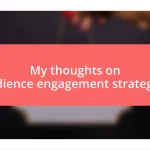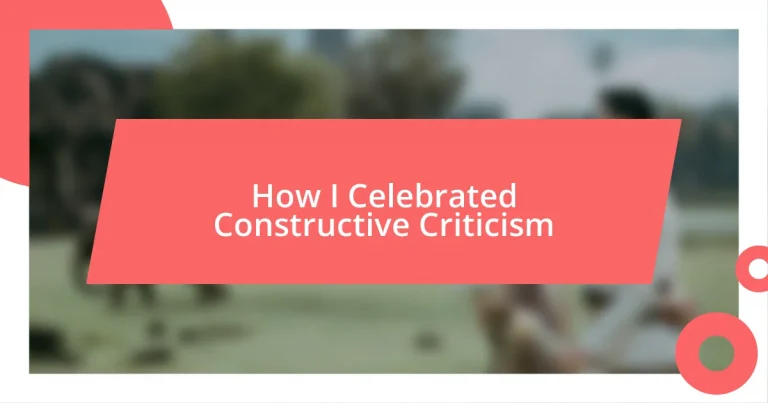Key takeaways:
- Embracing constructive criticism as a valuable opportunity for growth, rather than as a personal attack, enhances professional development.
- Implementing actionable feedback and adjusting routines can lead to significant improvements in skills and productivity.
- Sharing progress and celebrating milestones with others fosters accountability, motivation, and camaraderie in the growth journey.
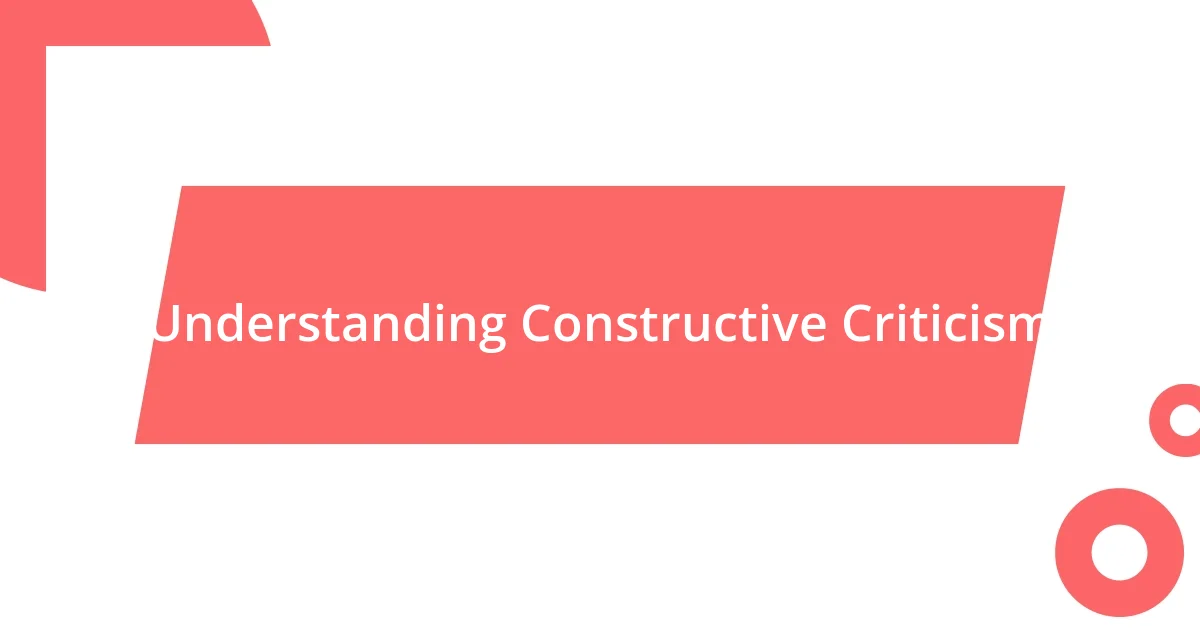
Understanding Constructive Criticism
Understanding constructive criticism is about recognizing its value rather than viewing it as a personal attack. I remember feeling defensive when a colleague pointed out flaws in my presentation. At first, I was upset, but then I realized their feedback was meant to help me grow. Why do we often dread feedback? Perhaps it’s closely tied to our self-esteem and how we perceive ourselves professionally.
When I shifted my mindset, I started to see constructive criticism as a gift. It’s not just about what needs to be improved; it’s also an opportunity to refine my skills. I vividly recall a mentor who offered advice on my writing style—she highlighted areas of improvement and shared her own struggles in the past. Her approach made it easier for me to absorb the feedback and inspired me to keep honing my craft.
Embracing constructive criticism can lead to profound personal and professional growth. Have you ever considered that the most successful people actively seek feedback? Personally, I’ve found that each piece of advice strengthens my resilience. By focusing on the intention behind the feedback rather than my initial reactions, I’ve become more open and receptive, fostering a continuous cycle of improvement.
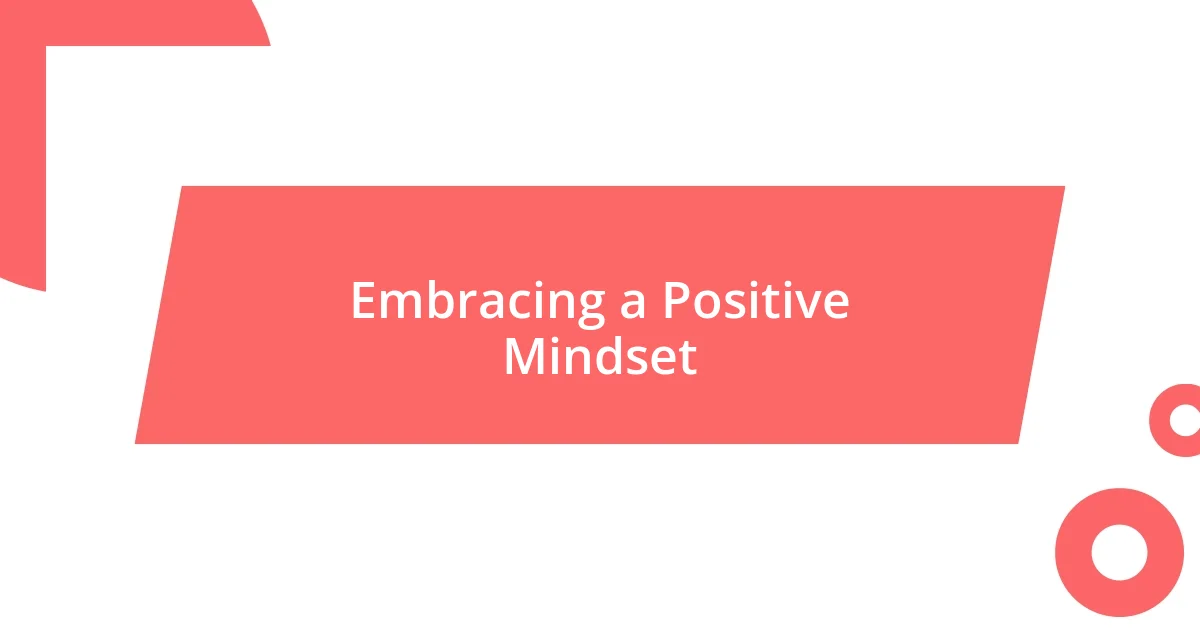
Embracing a Positive Mindset
Adopting a positive mindset is a game-changer when it comes to receiving constructive criticism. I remember a time when my boss critiqued my project proposal. Instead of feeling defeated, I took a deep breath and reminded myself that their feedback was meant to strengthen my work. That realization flipped a switch in my head; criticism became not a setback but a stepping stone.
Here are some strategies that helped me embrace this mindset:
- Reframe Negative Thoughts: When I catch myself feeling defensive, I ask, “What can I learn from this?”
- Practice Gratitude: Every time I receive feedback, I try to express gratitude towards the person offering it, recognizing their investment in my success.
- Set Growth Goals: I focus on how to implement the feedback by creating specific, actionable goals to guide my improvement.
By consciously applying these practices, I transformed the way I perceive and respond to criticism, making it an enriching part of my journey.
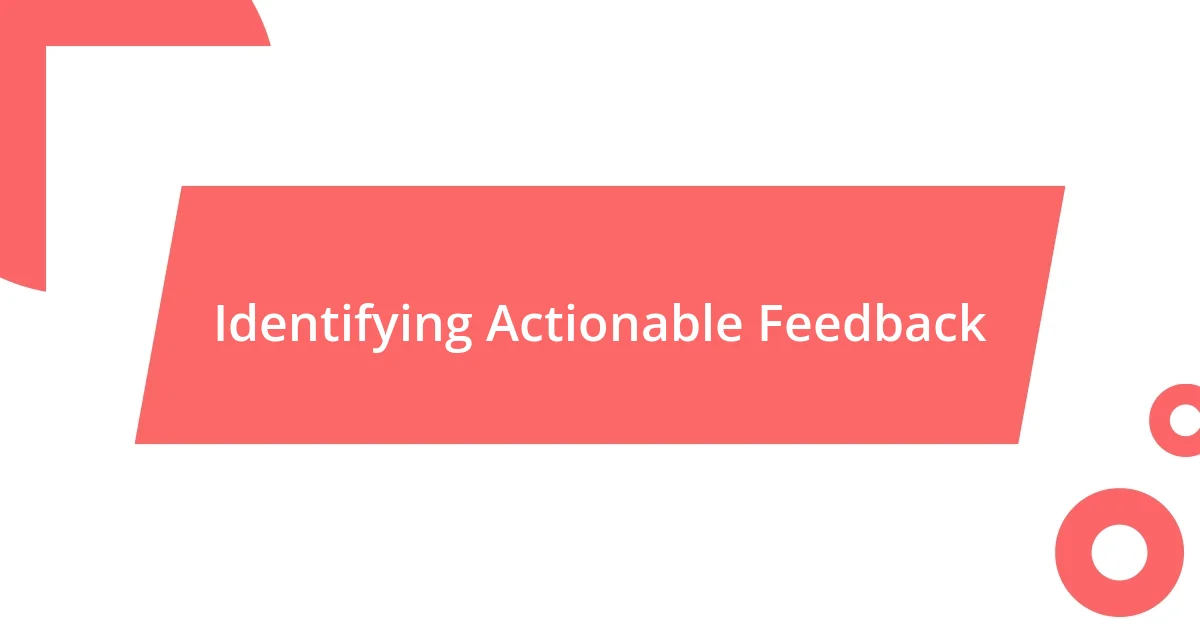
Identifying Actionable Feedback
Identifying actionable feedback is crucial for transforming criticism into growth opportunities. I’ve often found that the feedback with the most impact is specific and constructive. For instance, I once received a comment about unclear messaging in my marketing campaign. Rather than feeling defeated, I asked for examples to clarify the underlying issues, which provided a clearer path for improvement.
The process of sifting through feedback to identify what’s actionable can be quite revealing. I had a professor who would always start feedback sessions with, “What did you find worked well?” This approach not only encouraged me to recognize my strengths but also highlighted areas needing attention. By focusing on specific behaviors or aspects rather than vague statements, I learned to pinpoint exactly what changes I could make for better results.
Whenever I receive feedback, I mentally categorize it into actionable and non-actionable elements. It helps me prioritize and make informed decisions about which aspects to address first. One time, I got feedback that suggested my presentation lacked engagement. I took immediate action by researching interactive techniques and testing them out, which revitalized my approach. Exploring feedback this way has led to significant improvements in my work.
| Feedback Type | Example |
|---|---|
| Actionable | “Add more visuals to support your points.” |
| Non-Actionable | “I didn’t like your presentation.” |
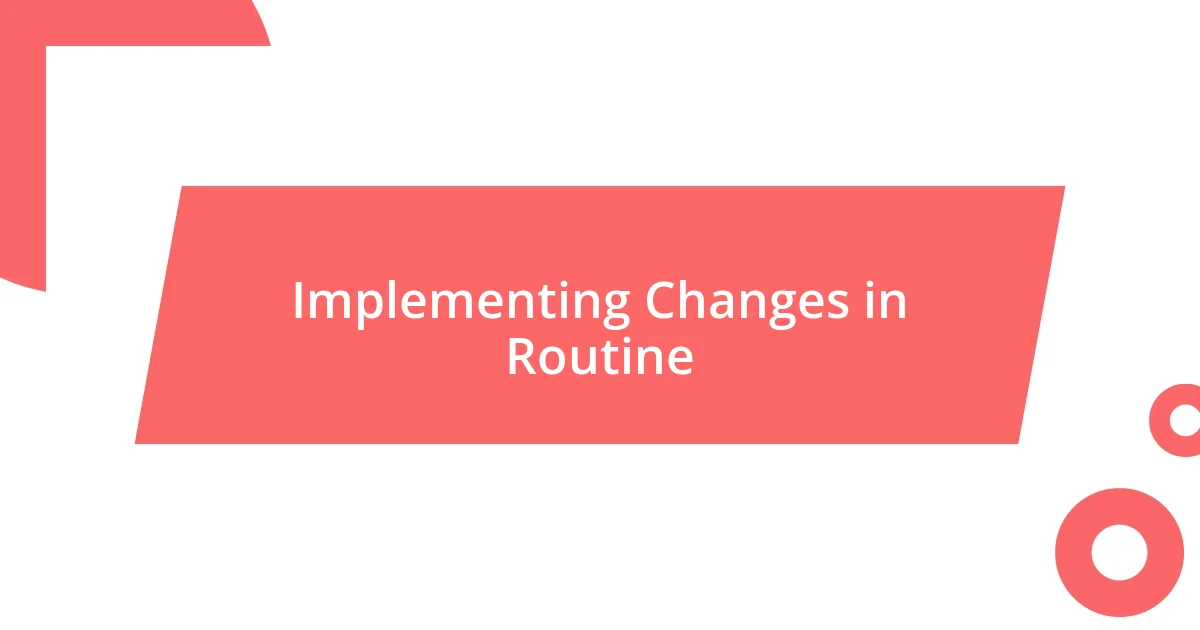
Implementing Changes in Routine
Implementing changes in my routine after receiving constructive criticism can feel daunting, yet it often leads to the most powerful growth. I vividly remember when a mentor advised me to set aside dedicated time for reflection each week. Initially, the thought of carving out time from my busy schedule seemed impossible, but once I did, I discovered how clarifying it was to assess my progress and redefine my goals regularly.
Adjusting my daily habits to incorporate constructive feedback isn’t just about making changes; it’s about building resilience. For example, after hearing that my time management could improve, I decided to try the Pomodoro Technique. Breaking my tasks into focused intervals made me feel more accomplished and less overwhelmed, and I noticed a shift in my productivity almost immediately. Have you ever experienced that rush of satisfaction from ticking off tasks on a list? It’s contagious!
Sometimes, small tweaks in my routine have had significant ripple effects. One time, I decided to start the day by reviewing feedback from previous weeks instead of diving straight into my tasks. This simple change helped reinforce the lessons I’d learned, keeping those insights fresh in my mind as I approached new challenges. It’s fascinating how such moments of reflection can enhance clarity and creativity in our work. Isn’t it amazing how a slight change can lead to a deeper engagement with our growth journey?
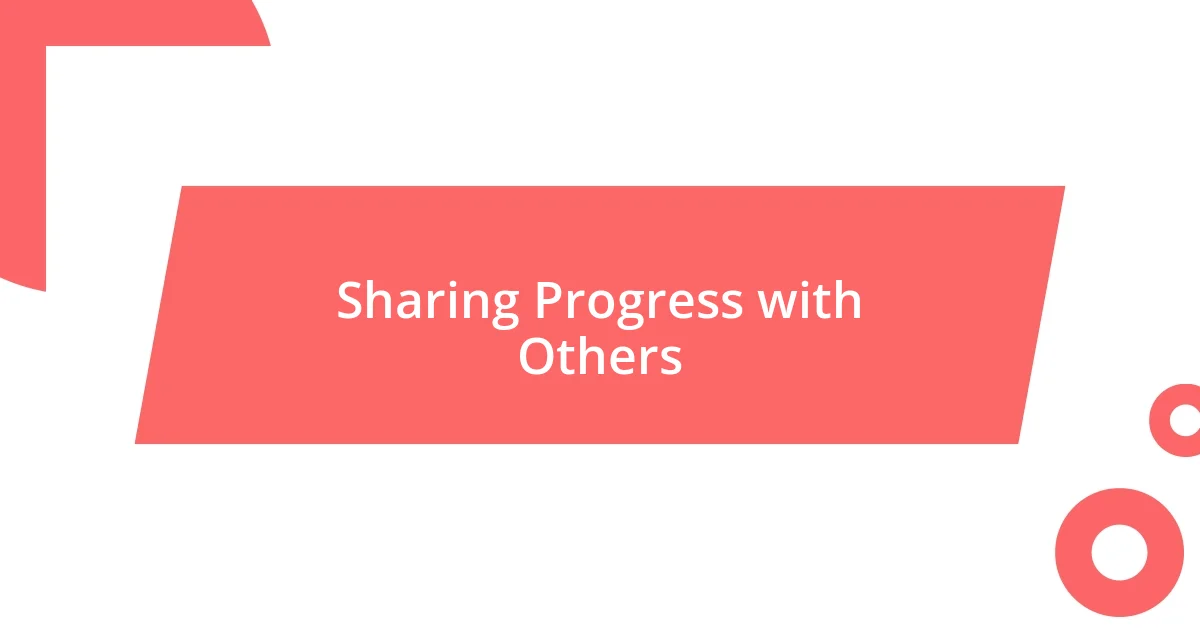
Sharing Progress with Others
Sharing my progress with others has always been a game-changer for me. When I started openly discussing my growth journey with colleagues, the response was overwhelmingly positive. I remember a time after I implemented feedback on my writing style; as I began to share drafts with peers, their insights not only motivated me but also fostered a supportive environment. Have you ever felt that rush when you realize others are invested in your growth?
I’ve found that sharing progress not only helps me stay accountable but also sparks interesting conversations. During one project, I posted regular updates on social media, inviting comments. The dialogues that ensued were illuminating—different perspectives often led me to consider aspects I hadn’t before. It’s incredible how discussing our progress can deepen our understanding of our own journeys, isn’t it?
There’s something deeply rewarding about celebrating milestones together. Recently, I collaborated with a friend on a project where we exchanged our progress weekly. Each small achievement became a shared moment of encouragement. I realized that these checkpoint discussions weren’t just about measuring success; they allowed us to build camaraderie and resilience in facing challenges. It’s like having a cheer squad for your growth—what could be better than that?
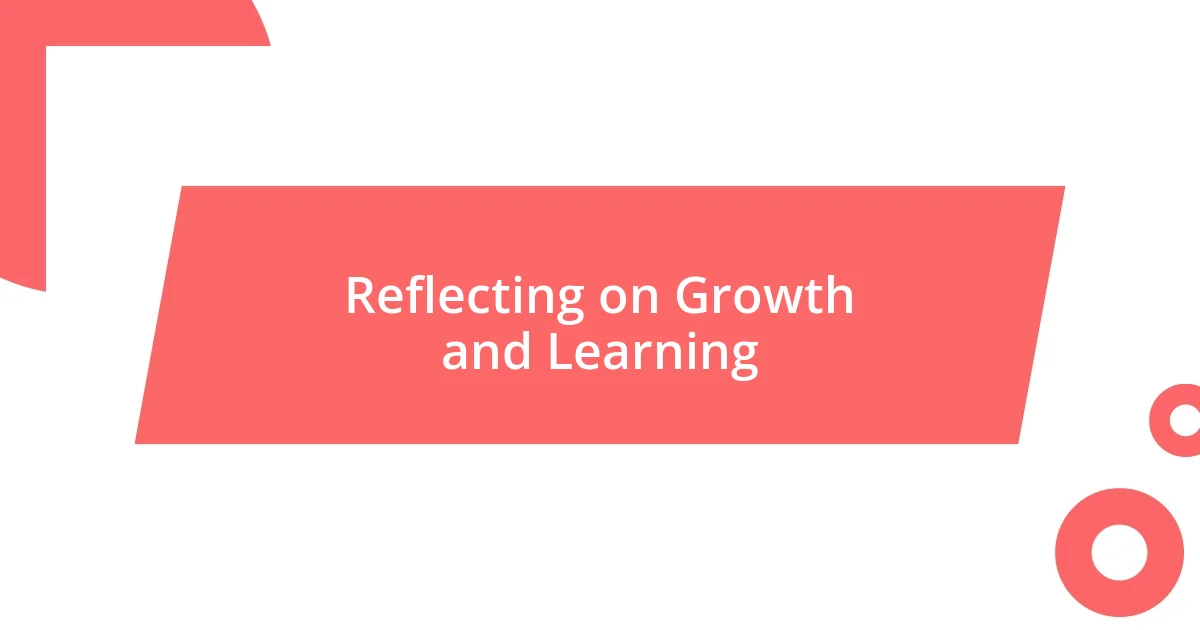
Reflecting on Growth and Learning
Reflecting on my growth after receiving constructive criticism has taught me more than just how to improve my skills; it’s helped me understand my own emotional resilience. I fondly recall a time when a colleague pointed out the need for a more audience-focused approach in my presentations. At first, I felt defensive, but upon reflection, I realized the truth in their feedback. It was a pivotal moment that pushed me to step outside my comfort zone and connect with my audience on a deeper level. Have you ever had a moment where a seemingly harsh critique turned into a turning point?
Looking back, I see that my best learning experiences emerged from the discomfort of candid feedback. In one instance, after a challenging performance review, I started keeping a journal to document my thoughts and reactions. This practice transformed my disappointment into a productive dialogue with myself. I found it comforting to write down not just the criticisms but also my commitments to change. It’s funny how writing can clarify feelings, right?
In the grand scheme of my development, these reflections serve as a guidepost. They remind me that growth is not merely about achieving perfection, but embracing the journey, flaws and all. I remember celebrating a small victory after altering my approach to projects based on feedback. Sitting with my favorite cup of tea, I smiled as I read through what I’d learned from each setback and how those lessons shaped my work. How often do we pause to acknowledge our progress? It’s essential for keeping the motivation alive.
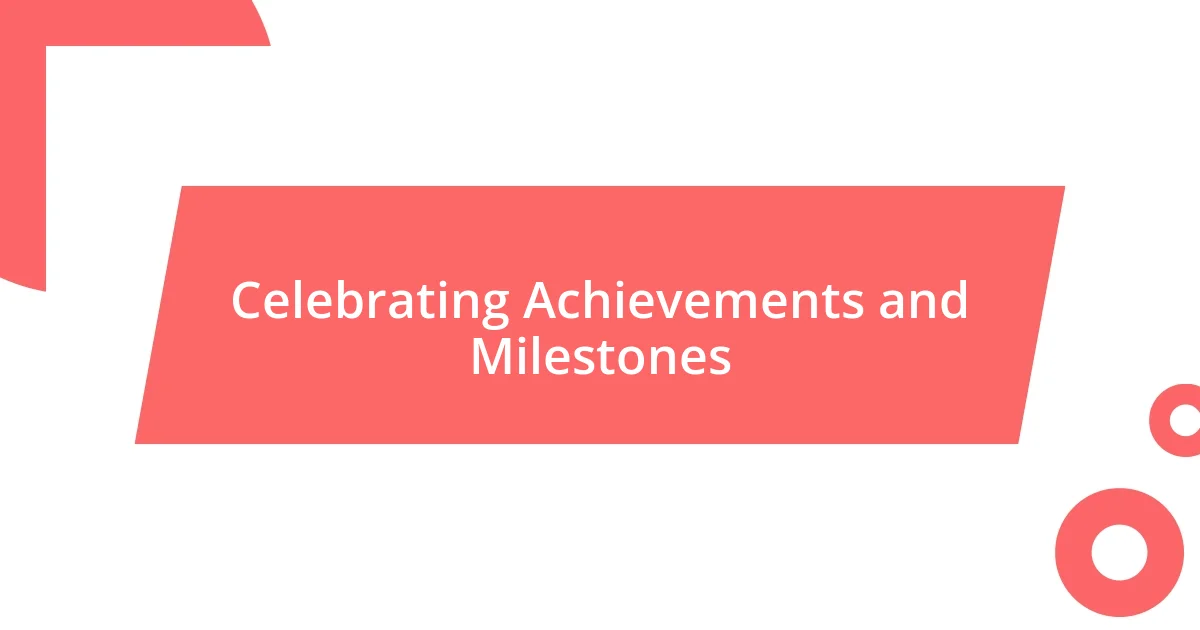
Celebrating Achievements and Milestones
Celebrating achievements and milestones has been a key part of my growth journey. I recall a particularly meaningful moment when I completed a challenging project after months of feedback and revisions. I decided to treat myself to a cozy dinner at my favorite restaurant to mark the occasion. It wasn’t just a meal; it was a tangible reminder of the hard work and dedication that led me there. Have you ever found that simple acts of celebration can rejuvenate your spirit?
Sometimes, the simplest milestones have the most profound impact. Last year, I set a goal to read five new books that pushed my perspective. Each time I finished a book, I would take a quiet moment to reflect on how the insights applied to my life. It was a small celebration, but it felt monumental to realize how far I had come in broadening my understanding. Can you recall a time when a little victory made you feel unstoppable?
I believe that celebrating milestones with others can amplify the joy. A few months ago, I invited a group of friends over to share in a small gathering after receiving some positive feedback on a presentation I’d done. We shared stories about our successes and the bumps along the way. It became a strengthening moment for our friendships and our aspirations. Was it the feedback that mattered most, or the warmth of shared celebration? I often find it’s the latter that truly fuels our growth.








